foundation
PURPOSE
Presentation of the Foundation production project line dedicated to build and deliver CYBNITY specification and implementation components versions.
Feature specifications API versions (e.g interface versions) are delivered according to requirements and specification identified by MVF project line’s prototyping results.
Feature implementations versions are designed and delivered as official Foundation Core implementation software.
Sources Structure
Implementation components projects are structured and built according to standards:
- Maven: Java components using a standard Maven project structure
- NPM: JavaScript components
- Docker: system containers and images templates are managed by each project (e.g via auto-generated Dockerfile by Maven process)
- Helm: parameters and Kubernetes resources configuration using a standard Helm structure
- Terraform: Kubernetes clusters and networking configuration
The implementation projects are supported by an Official TechStack version defining the authorized technologies used by any the software sub-project.
COCKPIT-FOUNDATION COMPONENTS
The source codes managed in this area of Foundation project are about the capabilities provided to the users (e.g web ui services provided to user’s web browser) via the user interface layer.
The implementation source codes realizes interactive functions provided by UI Modules (UI layer providing functional or technical capabilities) to deliver User eXperiences (UX) to the solution final users of CYBNITY solutions.
- Actions & Scheduling UI module
- Assets & Perimeters Protection UI module
- Automation UI module
- Awareness & Training UI module
- Behaviours/Situations Anticipation & Control UI module
- Commandment UI module
- Coordinations UI module
- Dashboard & Threshold
- Defensive Maneuvers UI module
- Defensive Responses & Controls UI module
- Goals & Evidences UI module
- ISMS & Strategy UI module
- Missions & Programming UI module
- Operational Excellence UI module
- Operational Recovery UI module
- Operations Cartography UI module
- SKPI & Dashboard UI module
- Stakeholders & Responsibilities UI module
- Standards & Compliances UI module
- Threat/Risks Prevention & Treatment UI module
- Vulnerabilities Prevention & Treatment UI module
Some shared deployable modules (e. endpoints) are also implemented at the UI layer level:
- Web Reactive Frontend server (ReactJS / Node.js web app)
- Reactive Messaging Gateway (Vert.x Reactive Backend server)
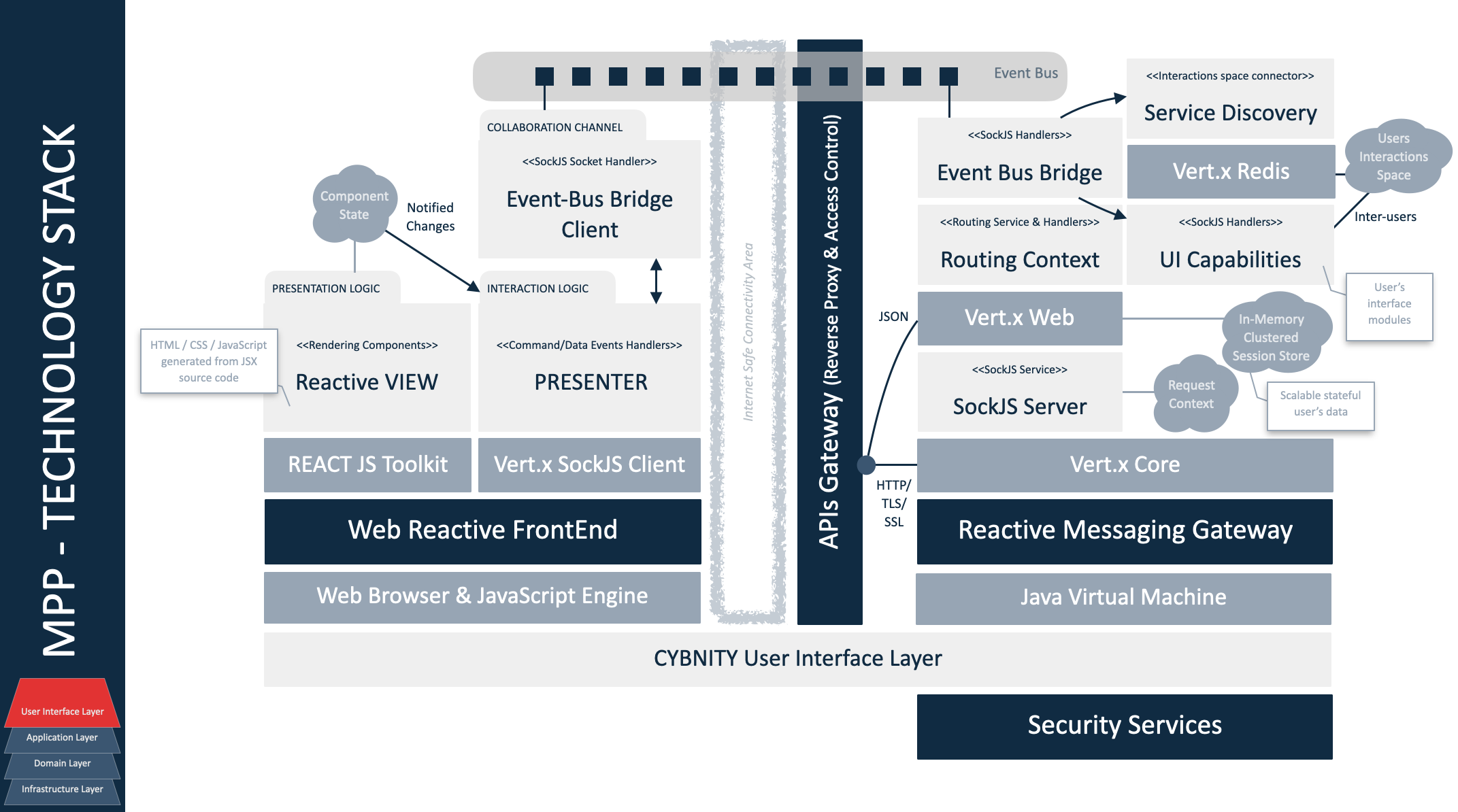
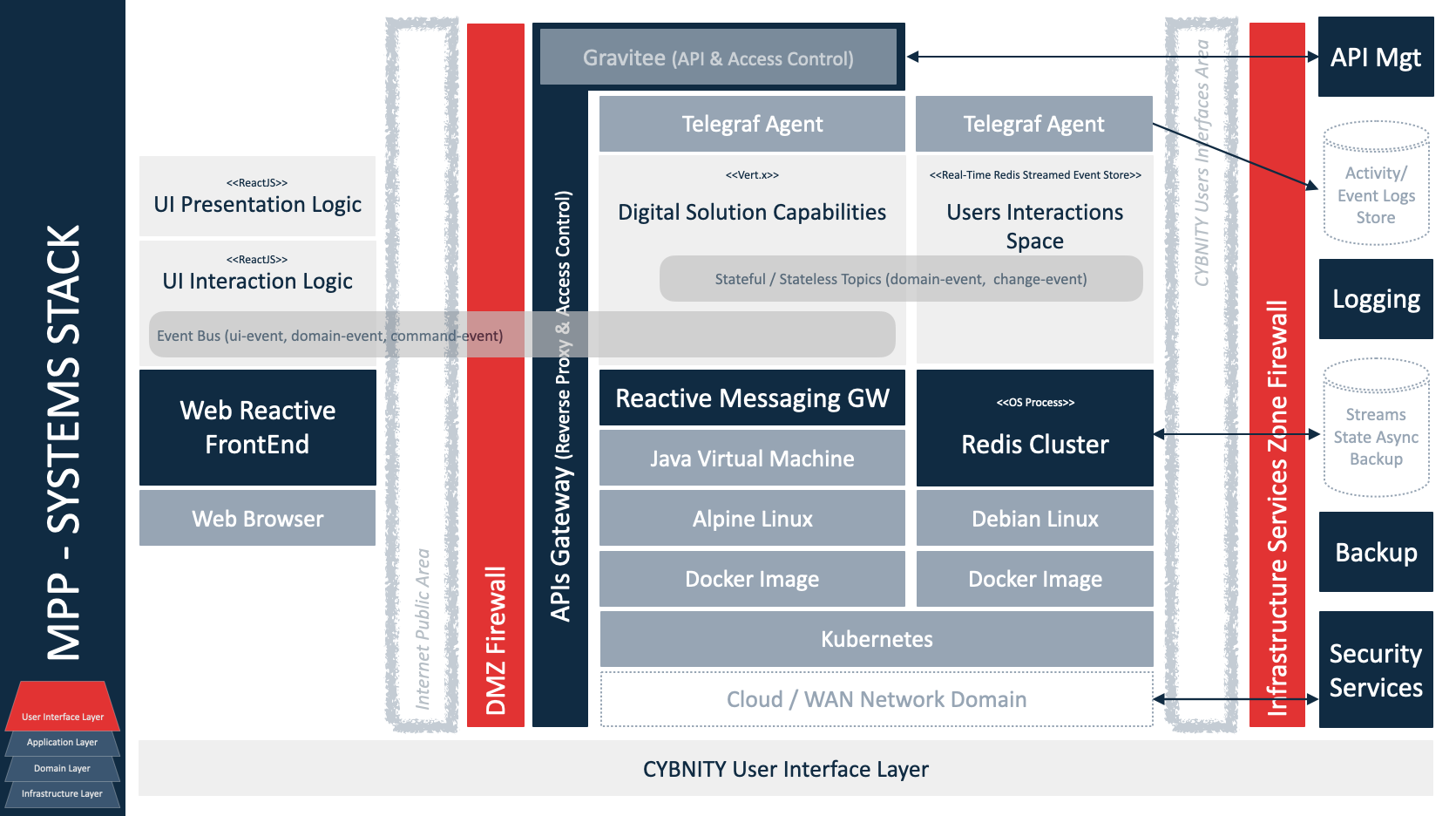
APPLICATION COMPONENTS
The source codes managed in this independent projects are dedicated to each CYBNITY applicative domain. Each application module dedicated repository manages its source codes structure via repositories with prefix “domain-“:
- Access Control module
- API Management module
- Asset Control module
- Audit Management module
- Awareness & Culture Management module
- Behavior Intelligence module
- Compliance & Certification Management module
- Detection Intelligence module
- Governance Management module
- Posture & Prevention Management module
- Quality Management module
- Response Management module
- Risk Management module
- Security Event Management module
- Threat Intelligence module
- Trial & Training Management module
- Vulnerability Management module
Each application domain distributed into the Application Layer aggregates deployable implementation components:
- One « Domain Name » Gateway Module (main domain gateway equals to endpoint of the bounded context supporting the Anti-Corruption-Layer requirements and implementing Dynamic Router/Recipient List combined architectural patterns)
- Several deployable Process Modules
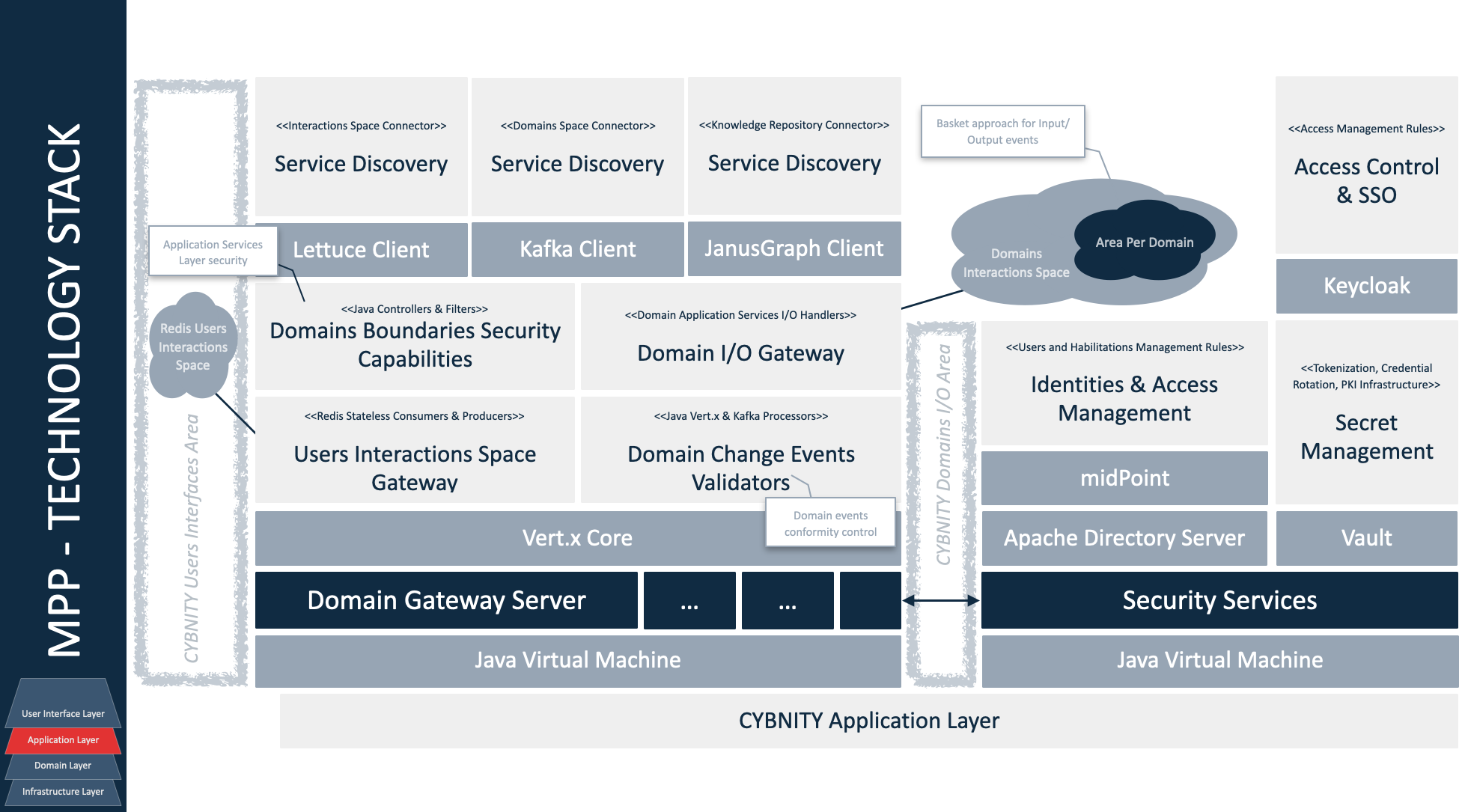
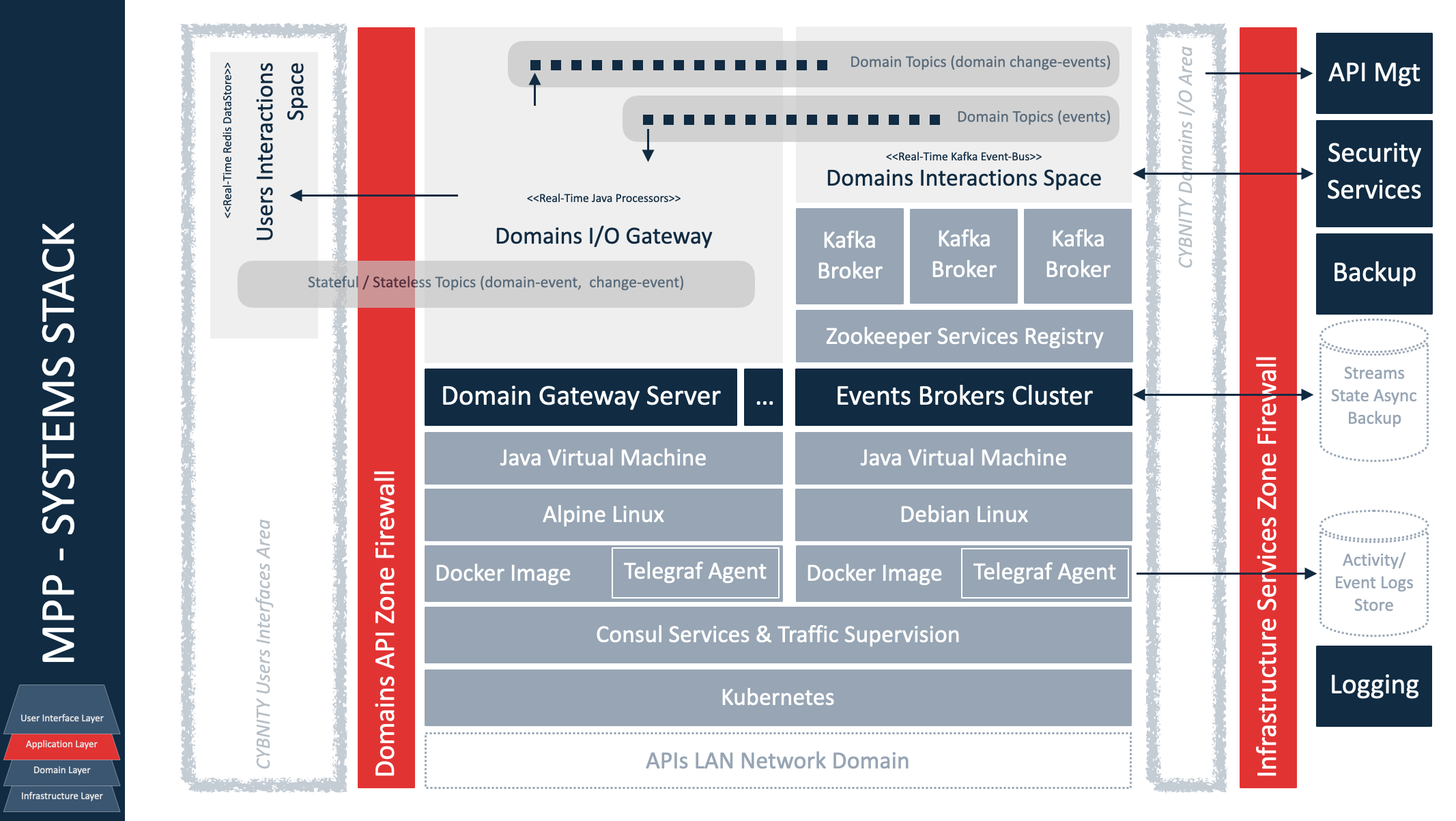
FEATURE COMPONENTS
The features implementation modules providing services which can be embedded by an application domain and/or can be exposed as reusable/common/shared function at one or several layers of the CYBNITY software.
The implementation source codes mainly are Java libraries which can be reused.
For example, a common feature library can be embedded into an application domain or can be independently deployed as a micro-service serving several application domain (e.g as a cluster of a specific technical feature instances).
Several categories of features are implemented through Java libraries regarding:
- domain: libraries of cyber-serenity features helping final user to manage its ISMS via processes, workflow, combined set of application feature integrated into the UI capability components
- feature-framework: library of common and generic utility components (e.g technological classes reusable by any feature implementation project) that does not contain any business/domain functions
- integrated-partners: features provided by CYBNITY compatible partners’ components (e.g accessory) and adapted via compatibility connectors
- operating-system: technical features provided by operating systems (e.g hypervisor, virtualization component)
- physical: features provided by physical devices integrated
- technical: features providing technical services (e.g strongbox, traceability, versioning, encryption) and implementing reusable functions by any CYBNITY component
- transport: features relative to communication layer between systems and/or application components (e.g firewalling, network monitoring)
- workflow-process: features providing generic workflow and processes management implementation models
Domain Layer
Each application domain can more or less separate its features in micro-services as deployable Feature Modules to manage the processing parallelization via Real-Time Stream Computation Units.
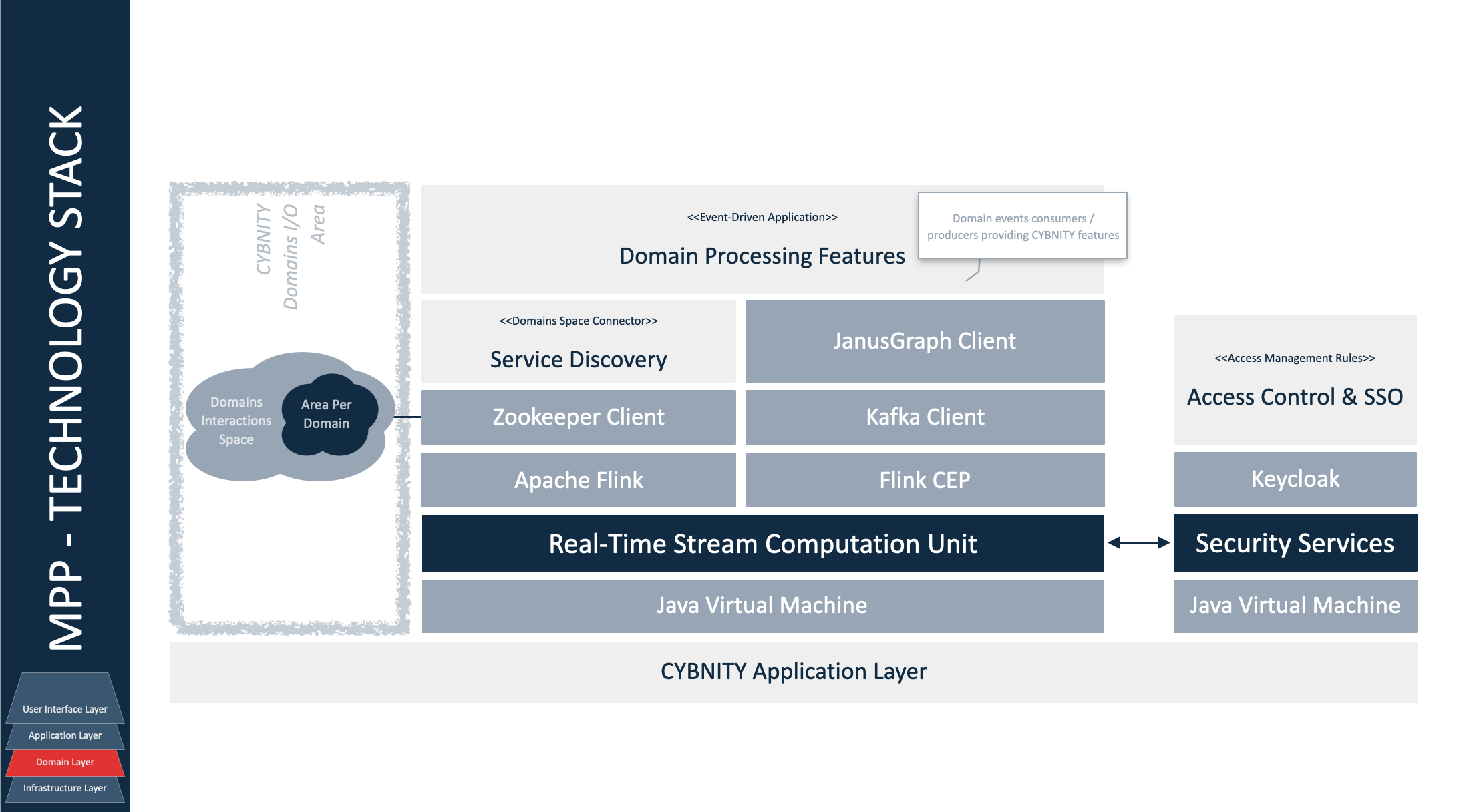
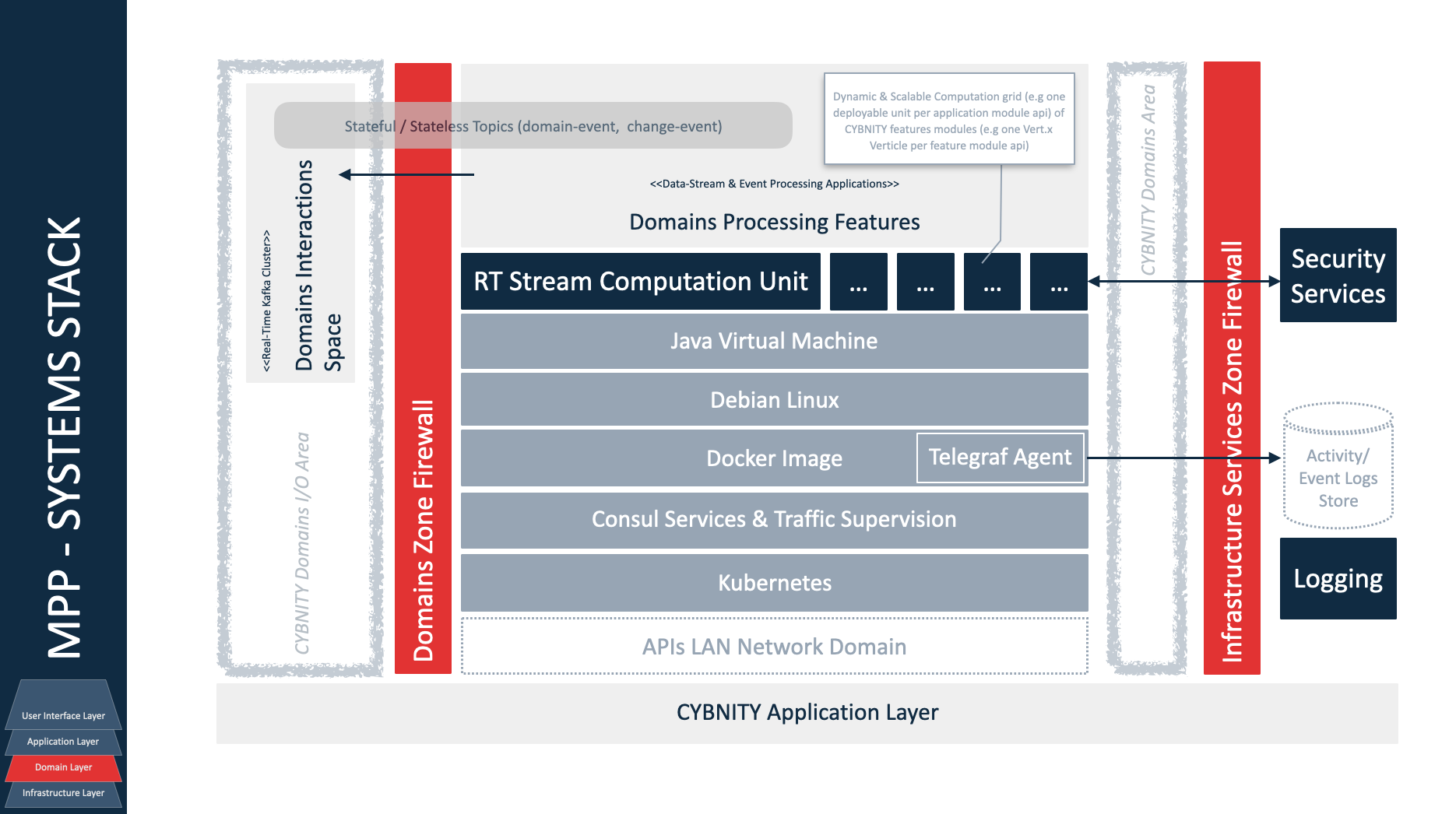
Runtime Model of Feature Components
The scalability required by a specific feature component is supported by the implementation of a runtime model that include the deployment of a set of micro-service instances regarding it.
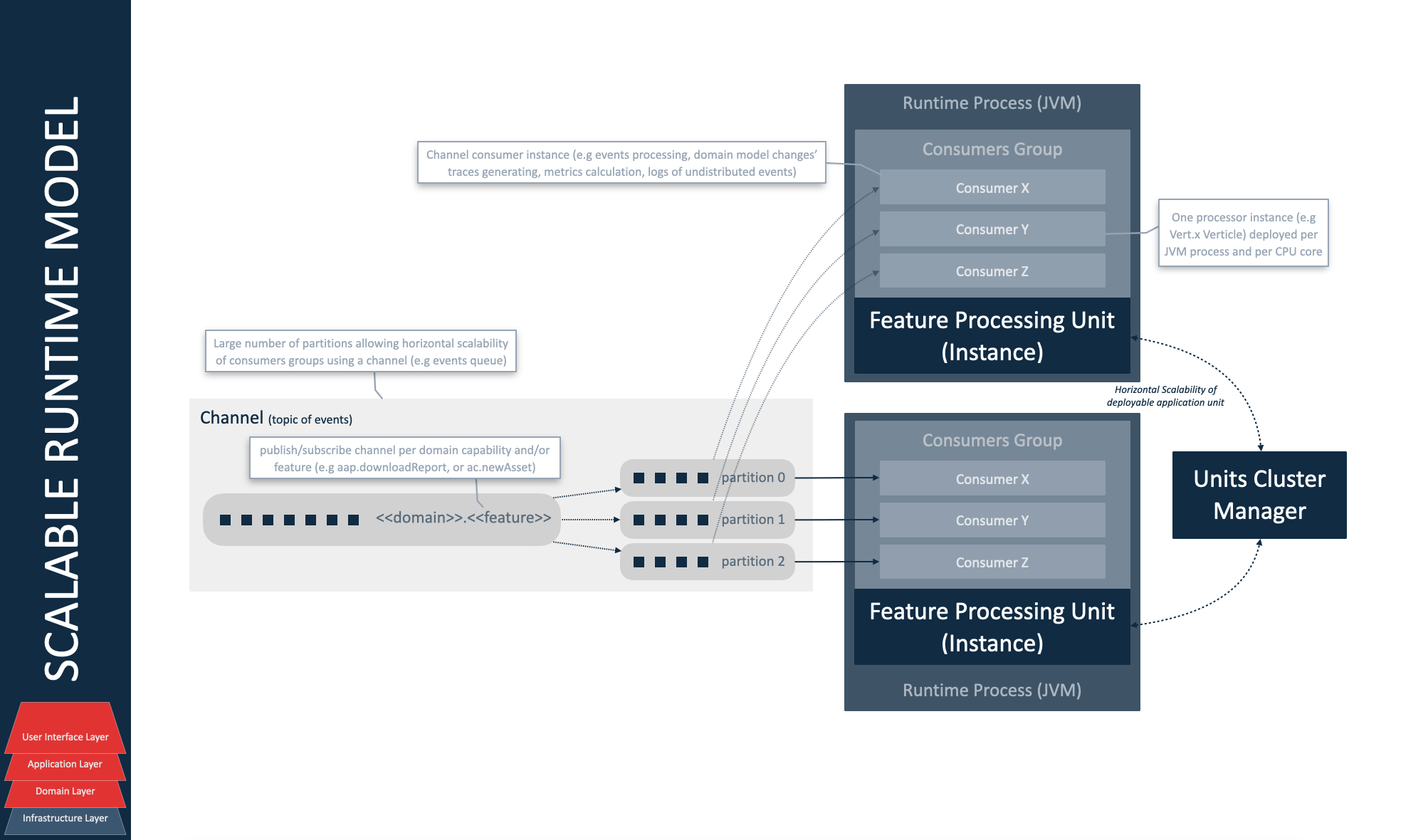
INFRASTRUCTURE COMPONENTS
The source code managed in this area are about the infrastructure components supporting the features and applications modules. For example, the implementation source code of an adapter client to a monitoring server (e.g proprietary solution integrated with CYBNITY over a connection adapter and/or via a protocol compatibility implementation) is provided as an infrastructure module.
Mainly, the Infrastructure Modules are provided as Java libraries of adaptation client implementations modules.
Several categories of infrastructure technologies are managed in terms of implementation codes:
- framework: shared and transversal frameworks (e.g immutability, event basics) of implementation and specification utilities
- continuity: clients of integration with Business Continuity systems
- integration: clients of integration with brokers of messages (e.g Redis cluster, Kafka cluster) allowing to discuss with other CYBNITY or third-parties systems
- Users Interactions Space adapter to brokers cluster
- Domains Interactions Space adapter to brokers cluster
- monitoring: clients to systems of monitoring (e.g alerting, data visualization, event logging)
- registry: clients of integration with registry systems (e.g ArangoDB database system) allowing to index and query domain’s data models (e.g read-model projections)
- Knowledge Repository adapter to database server
- security: clients to systems providing security services (e.g Single-Sign-On server, IAM server)
Any implementation component can be categorized as a Technical Service (implementation code executing a behavior, or implementation of a system client as adapter implementation module) or as a Integration API (when exposing a CYBNITY API exposed to other systems as an input/output point via a standardized protocol).
Shared Infrastructure Services
For example, the infrastructure implementation modules allow to manage the dependency with common systems reused (e.g based on open source and/or proprietary partners software instances) into a CYBNITY solution architecture deployment.
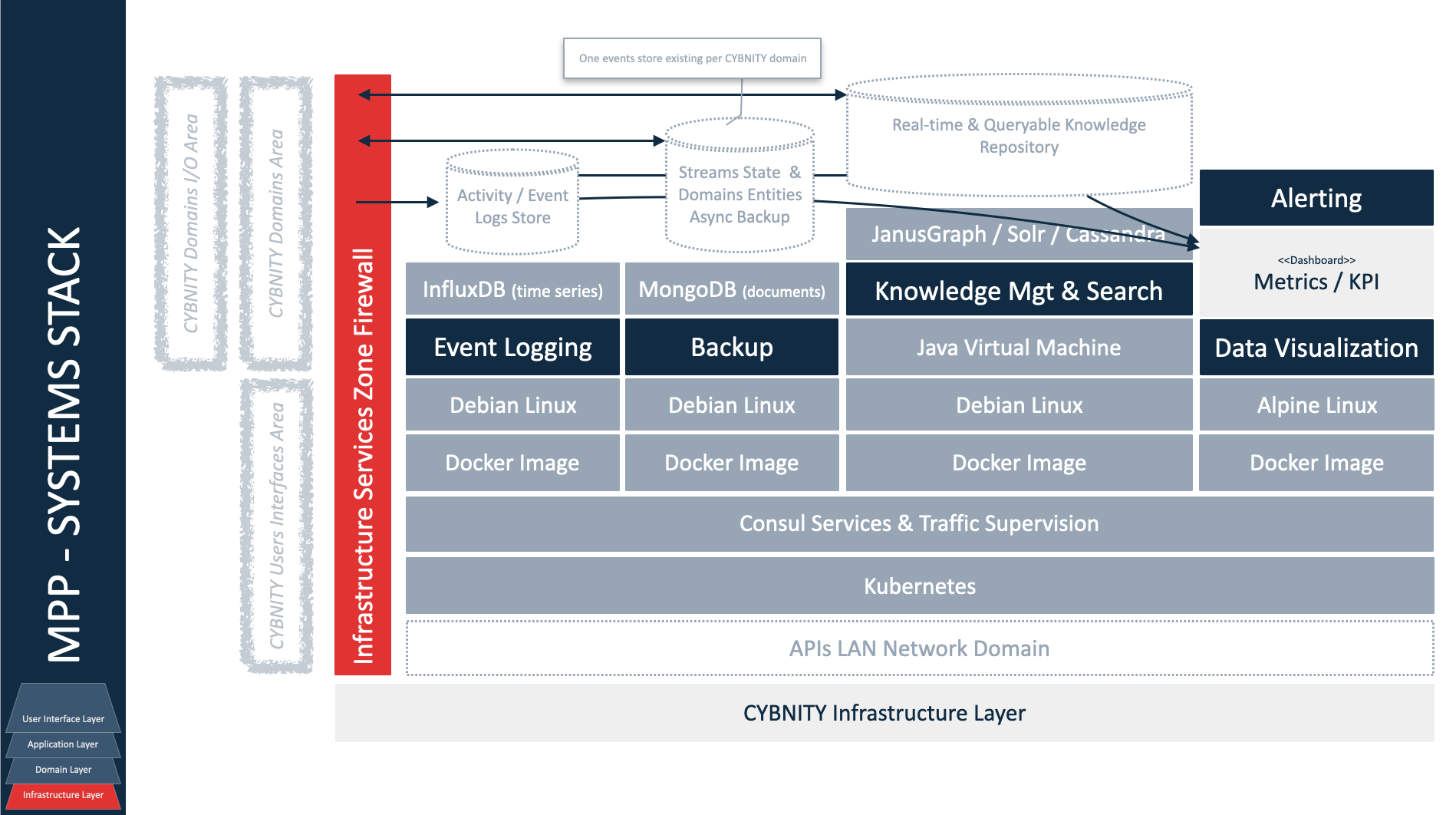
Common Transversal Components
Example of common event-based principles using a common infrastructure library regarding generic event.
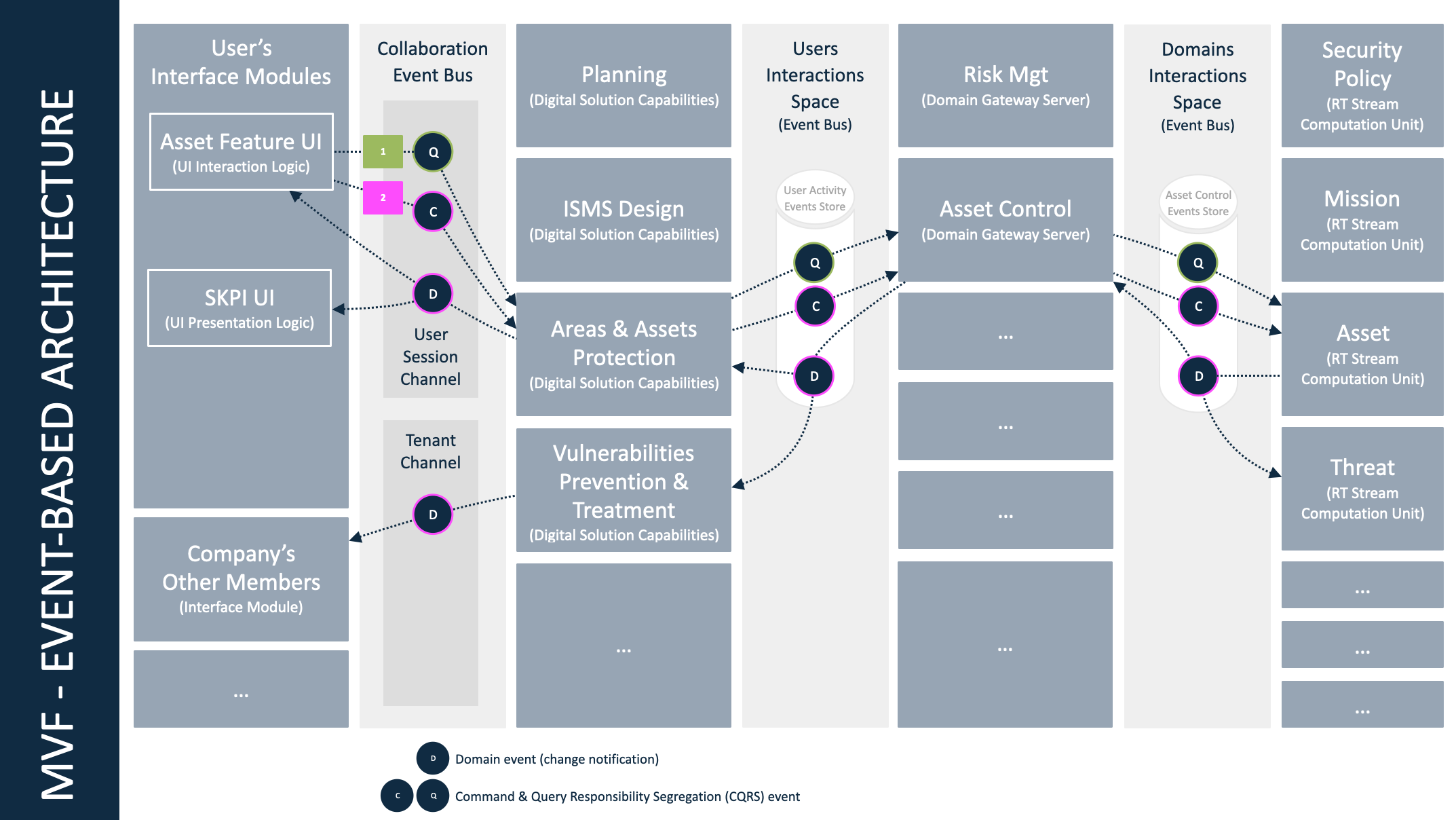
DEPLOYABLE & RUNNABLE MODULES
Several types of applicative or infrastructure modules are developed and containerized as executable systems which can be deployed and operated on standalone (e.g OS on laptop, virtualized hardware) or on cloudified hardware platforms (e.g Kubernetes, OVH Cloud hosting, public cloud).
See for more detail in systems architecture documentation about the implementation modules and packaged systems constituting the CYBNITY software suite.